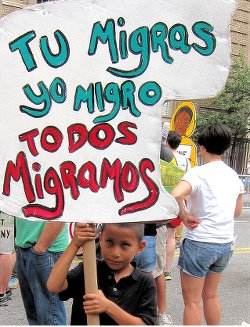Peoples Climate March protesters say: ‘We know who is responsible’
Activists in over 2,808 cities in 166 countries participated on Sept. 21 in the first international Peoples Climate March. The events took place two days before more than 120 world leaders will convene for the United Nations Climate Summit in New York City on Sept. 23 to plan for a new global climate treaty in 2015.
By far the largest turnout was in New York, where as many as 400,000 demonstrators gathered to fill the streets of Manhattan along Central Park West from 86th Street to Columbus Circle and then jammed the entire 2.2-mile march route.
The New York march was led by survivors of Hurricane Sandy, the 2012 mega storm fueled by climate change that displaced thousands of people on the East Coast. Residents of Moore, Okla., where 24 people were killed by a massive tornado in 2013, also marched. The National Black Environmental Justice Network participated, including people impacted by 2005’s Hurricane Katrina.
Other contingents included Indigenous peoples from North and Central America and members of the Bolivarian Alliance for the Americas (ALBA). Delegations came from many U.S. states and Canadian provinces impacted by fracking or threatened by gas and oil pipeline development.
A labor contingent marching behind a streetwide banner that read “Healthy Planet and Good Jobs” included members of the UAW, Teamsters, and 1199 SEIU, who carried signs with the message, “Climate change is a health care crisis.”
Palestinian contingents could be seen along the march carrying signs opposing Israeli apartheid and occupation of the West Bank and Gaza. Other signs identified the U.S. military and the Pentagon as the single largest contributor to pollution and global warming. Several protesters carried banners and signs calling for justice for the Cuban Five.
While the turnout included people of all ages, the participation of youth was particularly impressive. Students and faculty from high schools and colleges attended, including a delegation under the banner “Historically Black Colleges and Universities.”
While many marchers carried signs urging action to “Save the Planet,” others did not hesitate to label capitalism as the cause of planetary destruction and urged “System Change, not Climate Change.”
Clearly influenced by funding from some of the same corporations responsible for global warming, the official organizers of the Peoples Climate March did not raise demands nor were there speakers or a sound system that could be heard through the entire length of the event. The only official part of the event that unified all the delegations was a moment of silence followed by coordinated chants and whistle blowing.
One section has a strong message
To compensate for this lack of messaging, several contingents brought their own sound systems and staged rallies prior to the start of the official march. The most militant, diverse and revolutionary contingent in the Peoples Climate March was a block-long gathering under the general theme, “We know who is responsible,” that gathered along Central Park West near 79th Street.
A broad array of groups participated there in a unity rally co-chaired by Joe Lombardo of the United National Antiwar Coalition and Sara Flounders of the International Action Center. The drums and gongs of BAYAN-USA, the International League of People’s Struggle and Nodutdol for Korean Community Development kept spirits strong as people waited to march out.
Bernadette Ellorin of BAYAN and Hyun Lee from the ILPS addressed the gathering. The audience included representatives of community groups that had mobilized and brought forces to the rally to connect the corporate war on the environment with racist and imperialist wars at home and abroad.
Other speakers included Sumumba Sobukwe from Ocu-Evolve and Occupy Wall Street; Nellie Bailey of Black Agenda Report and the Harlem Tenants Council; and Larry Holmes from the People’s Power Assembly, who announced the next mass rally at the World Business Forum on Oct. 8 in front of Radio City Music Hall.
William Camacaro of the Bolivaran Circle; Lucy Pagoada of Honduras Resistencia; Carla García, a Garifuna representative; César Aponte, a climate activist from Venezuela; and Teresa Gutierrez of the May 1 Worker and Immigrant Right Coalition were among the Latino/a speakers and strong immigrant rights organizers.
Alisha of the Movement to Protect the People challenged gentrification in Brooklyn, while Betsey Piette, with the International Concerned Family and Friends of Mumia Abu-Jamal, addressed the danger of fracking in Pennsylvania. Larry Adams, a postal worker and vice president of the People’s Organization for Progress, also spoke.
Fatin Jarara of Al-Awda N.Y. caught the anger and resistance of Gaza and Dr. Khaldoun Makhoul and Avin Dirki raised opposition to the new war on Syria. Anti-war organizers Marilyn Levin, a coordinator of UNAC, Bill Dores of ILPS, Marty Goodman from Socialist Action, Comrade Shahid of the Pakistan USA Freedom Forum and James Jordan from the Alliance for Global Justice also offered perspectives.
Kevin Zeese of Popular Resistance and Ann Peterson of Global Justice Ecology announced the “Flood Wall Street” sit-in and protest actions planned for the next morning to highlight the role of the banks and corporations in the climate crisis.



